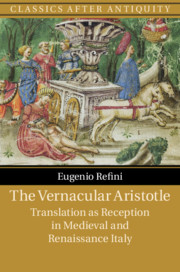Book contents
- The Vernacular Aristotle
- Classics after Antiquity
- The Vernacular Aristotle
- Copyright page
- Dedication
- Contents
- Figures
- Series Editors’ Preface
- Acknowledgements
- Notes on the Text
- Introduction
- Chapter 1 Taming the Philosopher
- Chapter 2 The Master of Those Who Know (and Those Who Don’t)
- Chapter 3 Family BusinessReadying the Ethics for the Layman
- Chapter 4 The Philosopher, the Humanist, the Translator and the Reader
- Chapter 5 Abridging the Philosopher(s)
- Conclusion
- Bibliography
- Index
Conclusion
The Spirit in the Crystal Bottle
Published online by Cambridge University Press: 10 February 2020
- The Vernacular Aristotle
- Classics after Antiquity
- The Vernacular Aristotle
- Copyright page
- Dedication
- Contents
- Figures
- Series Editors’ Preface
- Acknowledgements
- Notes on the Text
- Introduction
- Chapter 1 Taming the Philosopher
- Chapter 2 The Master of Those Who Know (and Those Who Don’t)
- Chapter 3 Family BusinessReadying the Ethics for the Layman
- Chapter 4 The Philosopher, the Humanist, the Translator and the Reader
- Chapter 5 Abridging the Philosopher(s)
- Conclusion
- Bibliography
- Index
Summary
The case studies analysed in this book show that the ‘vernacular readings’ of Aristotle between the age of Dante and the late fifteenth century are better understood when looked at through the interplay of translation, reception and concurrent debates about language. In the conclusion I discuss the Dialogo delle lingue (‘Dialogue on Languages’, 1542) by Paduan philosopher Sperone Speroni, which bears witness to the early canonisation of the questions examined in the previous chapters of the book. In particular, I look at Speroni’s fictional account of a dispute between the Aristotelian philosopher Pietro Pomponazzi and the Greek humanist Janus Lascaris about the use of the vernacular in the academic study of Aristotle. By contrasting the two interlocutors’ views on the matter, Speroni unveils the cultural issues at stake in the debate, namely the seminal role of translation in the dissemination of knowledge and the very notion of ‘vernacular language’ as a communicative tool able to perform such dissemination.
Keywords
- Type
- Chapter
- Information
- The Vernacular AristotleTranslation as Reception in Medieval and Renaissance Italy, pp. 224 - 232Publisher: Cambridge University PressPrint publication year: 2020



